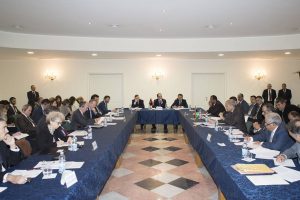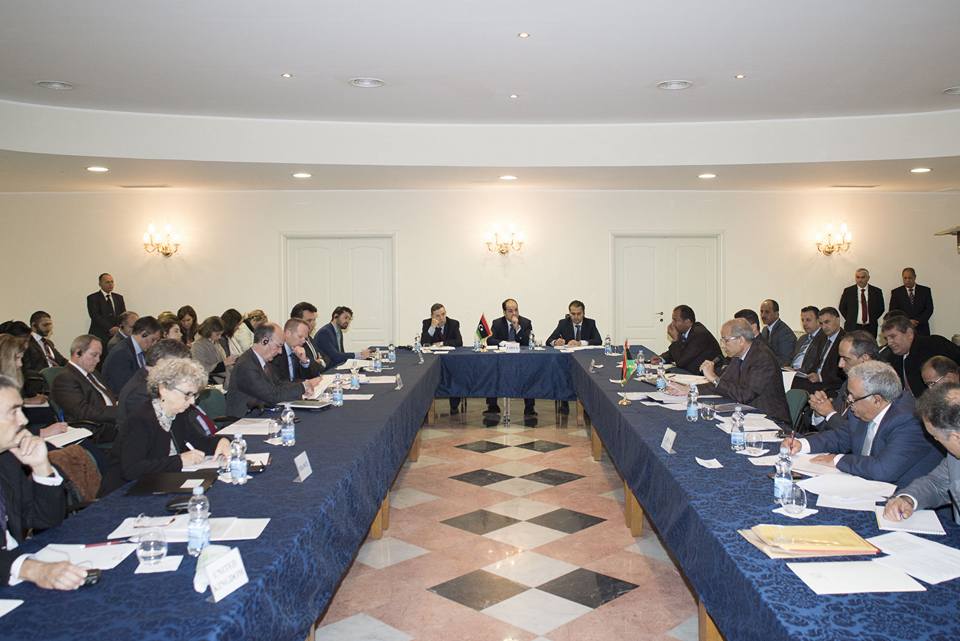By Libya Herald reporter.

Tunis, 17 November 2016:
Agreement was reached in Rome today by the Presidency Council (PC), the Central Bank of Libya (CBL), the National Oil Corporation (NOC) and the Audit Bureau to increase Libyan oil production and sales as well as to support the collapsing dinar in order to address the economic crisis facing ordinary Libyans. It was also agreed that the 2016-17 budget had to prioritise public services including healthcare and education.
Chaired by PC deputy Ahmed Maetig and attended by the UN, the World Bank, the International Monetary Fund and a number of ambassadors from the PC’s international supporters such as France and the UK, the meeting was the initial follow-up to the two-day London conference last month which focussed on rebuilding the economy.
In a statement afterwards, the Presidency Council said that there would be further discussions but that a clear timetable for the implementation of a package of economic decisions would be ready by 1 December 2016.
The basic plan as agreed at Rome is to increase oil production and sales by ensuring an increased flow of oil.
This has risen rapidly in recent weeks following the capture of three of the eastern oil terminals – Sidra, Ras Lanuf and Zueitina by the Libyan National Army from Ibrahim Jadhran’s Petroleum Facilities’ Guards. According to the NOC’s latest figures, the country is now pumping 600,000 barrels a day (m/d). With the reopening of Sidra, that could rise to the 900,000 b/d figure that NOC chairman Mustafa Sanalla wants to see by the end of the year.
There is also the matter of the taps on the pipeline from the south-western Sharara and Fil fields to the western oil terminal at Zawia. These are closed at Reyayna in the Jebel Nafusa. Their reopening would permit the Sharara and Fil fields to resume production. That would add a further 450,000 barrels a day (b/d) to current production.
There is considerable scepticism, however, as to whether the Reyayna taps will be reopened.
The taps are controlled by Zintan. Although allied to Khalifa Hafter, there is extreme reluctance in Zintan to reopen them. They, along with Seif Al-Islam Qaddafi, are seen as the town’s major political bargaining chip.
Question are also being asked about two other areas agreed in Rome: cooperation between CBL and the PC, and support for the dinar.
Relations between the CBL and the PC have deteriorated dramatically in recent weeks, in particular between CBL governor Saddik Elkaber and PC head Faiez Serraj. Both have publicly attacked each other. In an interview with the Libya Herald published just over two weeks ago, Serraj acknowleged that “in practice if our problems with the CBL . . are not resolved, we will remain in the same place”.
While the Rome summit indicates a formal willingness by the two to turn the page, there has been no indication so far that the CBL is prepared to take the practical steps required to significantly improve liquidity in the banks – the top problem facing the Libyan public.
As to support for the dinar which continues to plummet (it is now at LD 5.60 to the dollar compared to the official rate of LD 1.41), Serraj has said that it has to be devalued but that the CBL has refused to do so.
In Rome conference statement, though, the PC now says that it “will continue to work with the Central Bank of Libya, to support the Libyan dinar, by taking all measures necessary to do so”.
It is unclear what the apparently contradictory messages from the PC actually mean.









